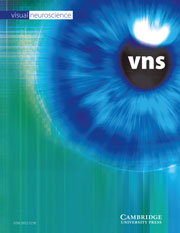Crossref Citations
This article has been cited by the following publications. This list is generated based on data provided by
Crossref.
Victor, Jonathan D
1999.
Temporal aspects of neural coding in the retina and lateral geniculate.
Network: Computation in Neural Systems,
Vol. 10,
Issue. 4,
p.
R1.
Bair, Wyeth
1999.
Spike timing in the mammalian visual system.
Current Opinion in Neurobiology,
Vol. 9,
Issue. 4,
p.
447.
Victor, Jonathan D
1999.
Temporal aspects of neural coding in the retina and lateral geniculate.
Network: Computation in Neural Systems,
Vol. 10,
Issue. 4,
p.
R1.
Kara, Prakash
Reinagel, Pamela
and
Reid, R.Clay
2000.
Low Response Variability in Simultaneously Recorded Retinal, Thalamic, and Cortical Neurons.
Neuron,
Vol. 27,
Issue. 3,
p.
635.
Edeline, Jean-Marc
Manunta, Yves
and
Hennevin, Elizabeth
2000.
Auditory Thalamus Neurons During Sleep: Changes in Frequency Selectivity, Threshold, and Receptive Field Size.
Journal of Neurophysiology,
Vol. 84,
Issue. 2,
p.
934.
Funke, Klaus
and
Kerscher, Nicolas
2000.
High-frequency (300–800 Hz) components in cat geniculate (dLGN) early visual responses.
Journal of Physiology-Paris,
Vol. 94,
Issue. 5-6,
p.
411.
Curio, Gabriel
2000.
Linking 600-Hz “Spikelike” EEG/MEG Wavelets (“ς-Bursts”) to Cellular Substrates.
Journal of Clinical Neurophysiology,
Vol. 17,
Issue. 4,
p.
377.
Liu, Robert C.
Tzonev, Svilen
Rebrik, Sergei
and
Miller, Kenneth D.
2001.
Variability and Information in a Neural Code of the Cat Lateral Geniculate Nucleus.
Journal of Neurophysiology,
Vol. 86,
Issue. 6,
p.
2789.
Murray Sherman, S.
2001.
Vision: From Neurons to Cognition.
Vol. 134,
Issue. ,
p.
51.
Swadlow, Harvey A.
and
Gusev, Alexander G.
2001.
The impact of 'bursting' thalamic impulses at a neocortical synapse.
Nature Neuroscience,
Vol. 4,
Issue. 4,
p.
402.
Samonds, Jason M.
Allison, John D.
Brown, Heather A.
and
Bonds, A. B.
2003.
Cooperation between Area 17 Neuron Pairs Enhances Fine Discrimination of Orientation.
The Journal of Neuroscience,
Vol. 23,
Issue. 6,
p.
2416.
Massaux, A.
Dutrieux, G.
Cotillon-Williams, N.
Manunta, Y.
and
Edeline, J.-M.
2004.
Auditory Thalamus Bursts in Anesthetized and Non-Anesthetized States: Contribution to Functional Properties.
Journal of Neurophysiology,
Vol. 91,
Issue. 5,
p.
2117.
Akerman, Colin J.
Grubb, Matthew S.
and
Thompson, Ian D.
2004.
Spatial and Temporal Properties of Visual Responses in the Thalamus of the Developing Ferret.
The Journal of Neuroscience,
Vol. 24,
Issue. 1,
p.
170.
Alitto, Henry J.
and
Usrey, W. Martin
2005.
Cortical Function: a View from the Thalamus.
Vol. 149,
Issue. ,
p.
83.
Grubb, Matthew S.
and
Thompson, Ian D.
2005.
Visual Response Properties of Burst and Tonic Firing in the Mouse Dorsal Lateral Geniculate Nucleus.
Journal of Neurophysiology,
Vol. 93,
Issue. 6,
p.
3224.
Alitto, Henry J.
Weyand, Theodore G.
and
Usrey, W. Martin
2005.
Distinct Properties of Stimulus-Evoked Bursts in the Lateral Geniculate Nucleus.
The Journal of Neuroscience,
Vol. 25,
Issue. 2,
p.
514.
Kumbhani, Romesh D.
Nolt, Mark J.
and
Palmer, Larry A.
2007.
Precision, Reliability, and Information-Theoretic Analysis of Visual Thalamocortical Neurons.
Journal of Neurophysiology,
Vol. 98,
Issue. 5,
p.
2647.
Long, Zaiyang
Liang, Zhen
He, Lihua
and
Zhou, Yifeng
2008.
CHRONIC MORPHINE EXPOSURE AFFECTS VISUAL RESPONSE LATENCY OF THE LATERAL GENICULATE NUCLEUS IN CATS.
Clinical and Experimental Pharmacology and Physiology,
Vol. 35,
Issue. 10,
p.
1222.
Haeusler, Stefan
Schuch, Klaus
and
Maass, Wolfgang
2009.
Motif distribution, dynamical properties, and computational performance of two data-based cortical microcircuit templates.
Journal of Physiology-Paris,
Vol. 103,
Issue. 1-2,
p.
73.
Ghose, Dipanwita
Barnett, Zachary P.
and
Wallace, Mark T.
2012.
Impact of response duration on multisensory integration.
Journal of Neurophysiology,
Vol. 108,
Issue. 9,
p.
2534.


